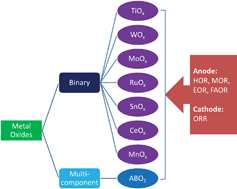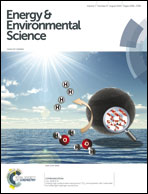An overview of metal oxide materials as electrocatalysts and supports for polymer electrolyte fuel cells
Abstract
Polymer electrolyte fuel cells (PEFCs) are promising power sources in portable and transportation applications because of their high energy densities, low operating temperatures and ease of transportation and storage. However, high cost, low activity and short durability of electrocatalysts are restricting the commercialization of PEFCs. Metal oxides have abundant sources, low cost, high chemical and electrochemical stability, abundant hydroxyl groups on their surfaces, and strong interactions with metal nanoparticles, and thus are promising to reduce the current problems of PEFCs. In this review, binary metal oxides such as titanium oxide, tungsten oxide, molybdenum oxide, ruthenium oxide, tin oxide, cerium oxide and manganese oxide, and multi-component perovskite oxides are chosen based on the selection criteria of metal oxides and introduced as independent electrocatalysts, co-catalysts and supports for various anode oxidation and cathode reduction reactions in PEFCs. The effects of composition, morphology, doping and mixing of metal oxides on their electrocatalytic performance in PEFCs have also been summarized. Finally, several of the most promising metal oxides and possible research trends of metal oxides are recommended for future PEFCs.


 Please wait while we load your content...
Please wait while we load your content...